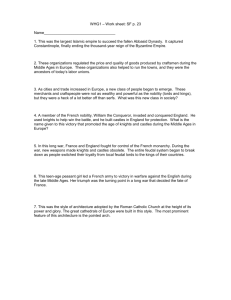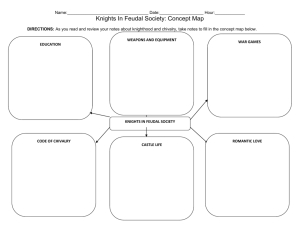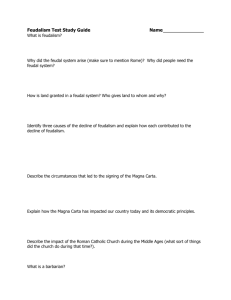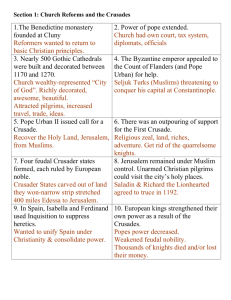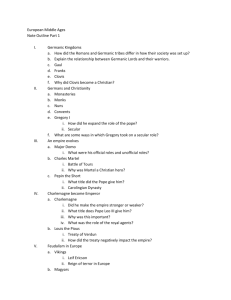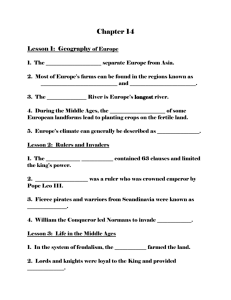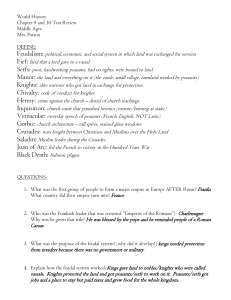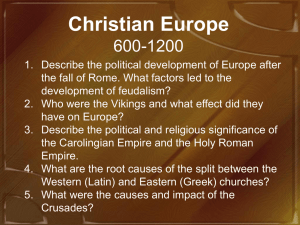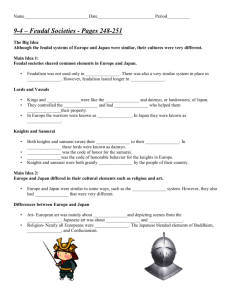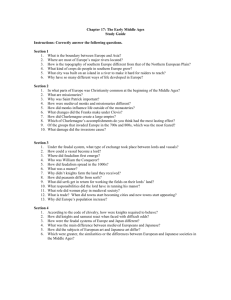Ch. 9 & 10 Medieval Europe Middle Ages 500 AD
advertisement
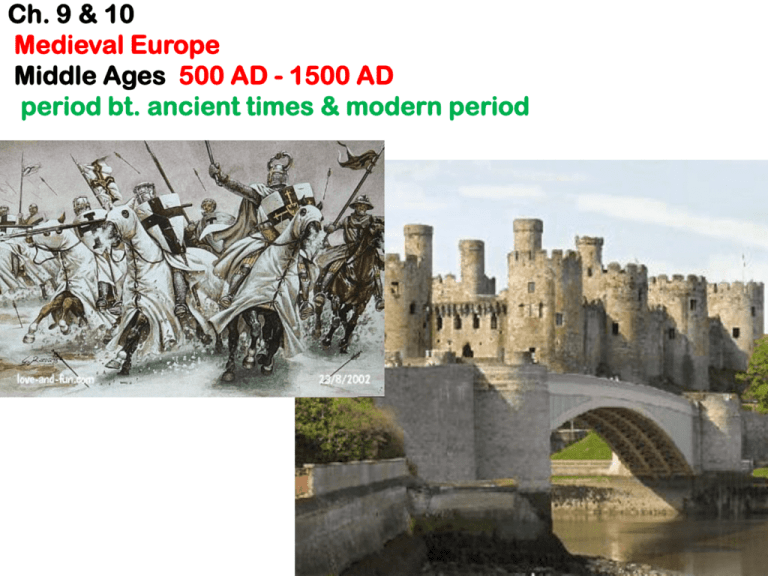
Ch. 9 & 10 Medieval Europe Middle Ages 500 AD - 1500 AD period bt. ancient times & modern period I. Germanic Kingdoms A. Franks *strongest of Germanic Tribes (modern France & Germany) France = Franks B. Frankish Rulers (Merovingian Rulers) 1. Clovis 481 AD *1st Barbarian King to become Christian “Jesus Christ, if you shall grant me victory over these enemies, I will believe in you and be baptized!” Battle of Alamanni 496 AD *control of old Western Roman Empire 2. Charles Martel “Charles the Hammer” Battle of Tours 732 *defeated invading Muslims *1st battle Knights wore Armor *starts Feudalism in Europe (rewarded Knights with land) 3. Pepin the Short 752 (son of Charles Martel) *elected King of Franks Pope Bishop of Rome *approved this appointment justified churches authority over political rulers 4. Charlemagne “Holy Barbarian” 768 – 814 “Charles the Great” 4 Contributions to History: 1. United Europe 1st time “King Father of Europe” Carolingian Empire *old Western Roman Empire Germany, France, N. Spain, & Italy Charlemagne’s Statue in Paris 2. Spread Christianity: Tithe 10% income paid to church Emperor of Romans Christmas Day 800 AD Pope Leo III *crowned Charlemagne Founded: Holy Roman Empire Aix-la-Chapelle *capital near Aachen, Germany Counts *Kings rep.s who ruled a region Missi Dominici (Lords Messengers) Monks find abuses by Counts 3. Carolingian Renaissance *rebirth in classical education (Greek & Roman) Carolingian Minuscule *form of writing we use today Monks copied Bibles 4. Feudalism land grants to nobles Treaty of Verdun 843 AD *divided Charlemagnes Empire 3 Kingdoms 3 grandsons after death Charles the Bald France Louis the German Germany Lothair Middle Kingdom II. Vikings 700 – 1100 AD Viking Age Vik (Bay or Inlet) A. Scandinavia: *Norway, Sweden, & Denmark Norse - Northmen B. Invade Europe: “To go Viking” “Scourge of Europe” “God, deliver us from the fury of the Northmen” European Prayer Berserker *Viking Warrior Blood Eagle form of torture Danegeld *gold or silver - pay off Vikes “Paying through the nose.” C. Great Explorers: Longboats “Dragon Ships” 70ft. Long / 16ft. wide (hold 30 – 40 men) Erik the Red *discovers Greenland 983 AD Lief Erickson 1000 AD *landed at Newfoundland (N. America) Vin Land Lief Erickson statue St. Paul Minn. D. Colonization Kiev, Russia 800 AD founded by Rus (Viking Warrior) Normandy (Men from the North) France 911 AD founded by Rolf the Walker E. Norse Gods: Wotan (Odin) *Wednesday *Chief Viking God Raven “Eyes of Wotan” Asgard *Viking Heaven Valhalla *home of Gods Thor *God of Thunder *Thursday Mjolnir Thor’s hammer Tyr God of War F. Sagas long stories & legends of Viking adventures G. Vikes became Christians III. Feudalism A. Charles Martel *starts feudalism Fief *grants of land B. Feudal Society: Kings Lords *great noblemen Vassals *lesser Lords Dukes, Counts, & Barons granted land swore homage to Lord Knights *mounted Warriors Merchants & Artisan’s Serf *Peasants 60% population granted use of land bound to manor C. Feudal Contract *rules bt. Lord & Vassal Homage *public ceremony Vassal swore allegiance Lord owned land vassal right to use it & serfs who lived there 40 Days military service to Lord Relief ransom payment for captured Lords D. Manor *large estate / land & village *economic unit of Middle Ages provide food, shelter, & protection farms & pastures for livestock shops, clothing, & food all produced in Manor Domain *land kept by Lord Castle *fortified home base for protecting manor Keep *main part of castle Moat ditch filled with water E. Knights in Armor *dev. invention of stir-up Chain mail armor made of metal links sword, shield, & lance Coat of Arms *symbol of indv. Knight Joust *contest among Knights William Marshal 1189 *greatest Knight of all time William Marshal Chivalry *code of conduct for Knights Code of Chivalry: brave in battle generous loyal keep your word courteous to women Rules of Warfare: Peace of God *no fighting on Holy Land ex. Churches Truce of God *forbid fighting on weekends & Holy days 80 days a year Knights could fight Knights *mounted warrior nobles proved themselves in battle Squire *Knights Assistant age 15 training & up keep of weapons & horse Page *learn Knightly manners age 7 IV. Medieval Church: 1200’s church power peaked *Christian Church dominates Europe functions of modern gov. ex. laws, courts, & taxes A. Church Hierarchy: 1. Pope *Bishop of Rome Papa (Latin for Father) spiritual leader of Christendom Gregory the Great 590 AD *1st Pope hold great power 2. Cardinals *advisors & elect Popes 3. Bishop *manage Diocese Cathedral - Bishop’s official church King appointed Bishops (Lord or Vassal) 4. Parish Priest *Mass collected taxes, care sick & poor, & teachers B. Canon Law *Church Laws 1. Excommunication *kicked out of church can't receive sacraments 2. Power to tax *Tithe Peters Pence one penny tax everyone in a home C. Monasticism Monks *total dedication to god Missionaries *sent to spread religious message Abbot *Head Monk of Monastery 1. St. Benedict 500 AD monastery at Monte Cassino, Italy Benedictine Rule *Laws regulated Monks “Idleness the enemy of the soul” teachers Pretzels (small reward) memorized prayers copy books Bible 2. St. Francis of Assisi 1210 AD Franciscans *help poor 3. St. Dominic Spanish Priest Dominicans *built schools & teachers preached repentance of sins D. Problems of Church 1. Corruption wealth & luxury 2. Heresy *question church doctrines Heretic *unbelievers 3. Inquisition 1232 - 1400's *torture & execution of Heretics Pope orders Dominicans to seek out Heretics V. Crusades 1095 – 1291 Christian Knights vs. Muslims A. Jerusalem *captured by Seljuk Turks 1071 B. Council of Clermont 1095 Pope Urban II *called for Crusades “God wills it!” Reasons for Crusades: *rescue Holy Land *forgiveness of sins *died gained salvation *taxes & debts excused Peoples Crusade Peter the Hermit *led unarmed Peasants to Holy Land thousands slaughtered C. First Crusade 1096 - 1099 *Crusaders capture Jerusalem “River of Blood” Knights slaughtered Muslim & Jewish 10,000 Butchered Set up 4 Feudal States: Jerusalem, Edessa, Antioch, & Tripoli Crusaders *Latin for Cross *Soldiers of Christ Red Cross *symbol of Crusaders D. Second Crusade 1144 - 1148 *Muslims 1st success against Christians Edessa falls to Turk Conrad III & Louis VII liberate Edessa Germany France total failure E. Third Crusade “3 Kings Crusade” 1189 - 1192 Jerusalem fell to Muslims 1187 Saladin the Magnificent *Muslim General King Richard “The Lion Hearted” England couldn't win Jerusalem back King Philip Augustus France Frederick Barbarossa Holy Roman Empire drowned Knights Templar *protect Christians traveling Holy Land F. Fourth Crusade 1204 *merchants from Venice, Italy paid Crusaders to destroy Constantinople G. Children’s Crusade 1212 Nicholas & Stephen led 20,000 French & German kids *sold into slavery N. Africa Hugh the Iron & William the Pig H. Results of Crusades: *Military Failure *Holy Land Muslim control power of Church increases shipbuilding expanded increase in trade Middle East power of Kings increased VI. Middle Ages Life A. Revival of Trade feudal war limited trade Wool *basis of trade Trade Fairs *market places Hanseatic League *assoc. of German cities (80) B. Growth of Towns permanent headquarters for merchants Inns to shelter traveler’s Artisans set up shops Charters *guaranteed town peoples rights C. Middle Class Bourgeoisie *France Burgesses *England Burghers *Germany D. Guilds *1st Unions *merchants & artisans set prices, wages & quality standards Just Price *cost of materials plus reasonable profit pricing goods at what people would pay sinful E. Apprentice System training to become artisan 1. Master Craftsman *guild member 2. Journeymen paid wages while worked for master *submit Masterpiece 3. Apprentice learn from Master (age 7 – 8) F. Economics 1. Money Economy 1200’s 2. Usury *loan interest outlawed by Church 3. 1st Bankers wealthy Italians 1300’s Bank - Banca – bench moneychangers used G. Feudal Justice Trial by Ordeal painful physical test ex. Hot Iron God decided guilt or innocence Trial by Combat Knight vs. Knight H. Agricultural Improvements: *crop rotation fallow horseshoe / iron farm implements food surpluses feed growing populations I. Medieval Literature 1. Beowulf *Anglo-Saxon warrior 700 AD defeated Grendel 2. Song of Roland 1100 AD *Charlemagne’s knights 3. Troubadours *traveling poet-musicians songs of love & feats of knights 4. The Divine Comedy by Dante *journey from heaven to hell 5. Canterbury Tales by Chaucer 1386 AD *pilgrims journey to Canterbury, England VII. Europe Late Middle Ages: Time of Trouble A. Bubonic Plague “The Black Death” 1347 - 1351 1/3 of Europe died 19 - 38 million originates Asia / spread trade routes *Fleas on Black Rats Flagellants *whip themselves beg forgiveness from God Plague punish man for sins Some of these early treatment included: bathing in human urine wearing of human excrement placing of dead animals in homes use of leeches drinking molten gold/powdered emeralds incising (cutting) and draining of abscesses (bubo) placing patients in pest houses and isolate them from the general public eating figs before six in the morning chopping a snake up everyday trying to fall asleep on the left side of the bed not to sleep during the day not exercising not eating any desserts Ring around the Rosies London 1664 nursery rhyme during the plague Ring around the Rosie Pocket full of Posies Ashes, Ashes We all fall down The "ring around the rosies" refers to the sores and the "pocket full of posies" refers to the flowers carried in the pockets of the dying to conceal the smell. The children skip in a circle holding hands and drop into a heap at "we all fall down." B. Hundred Years War *France vs. England 1337 -1453 Causes of War: Eng. controlled part of France Edward III King of England 1337 claimed right throne of France English Victories: Battle of Crecy & Battle of Poitiers new weapons: long bow & cannons end of Knights in Armor C. French Civil War Burgandy *supported English vs. Orleans Joan of Arc “The Maid 1412 - 1431 *inspire French victory over England May 30, 1431 *Burned at the stake witch & heretic Charles VII becomes King of France D. Decline of the Church 1. Babylonian Captivity 1309 - 1377 *headquarters of Pope to Avigon, France Pope pawn of French Kings decline in Papal prestige / greed $$$ 2. Great Schism 1378 - 1417 *2 Popes Rome & France VIII. Growth of European Kingdoms: A. England 1. Anglo-Saxons *2 Germanic Tribes Engla – Land “ Land of the Anglo’s” Shires *districts of Eng. Sheriff *district governor 2.Danes invade conquered much of Eng. 800 Danes English called Vikes Dane-Gold heavy taxes paid to Danes 3. Alfred the Great drove Danes out of Eng. 886 revival learning & literature 4. King Canute of Denmark 1019 - 1035 Dane King conquered Eng. 1019 1st Vike leader welcomed as equal to Christian Kings “Northern Empire” Eng. part of his Empire Danes driven out after his death 5. Edward the Confessor 1042 - 1066 religious fanatic (very weak King) Westminster Abby Church in London built by Edward the Confessor died childless - Battle for English throne dev.s 6.William the Conqueror - Duke of Normandy Edward promised William the throne vs. King Harold II Saxon King crowned King Jan. 16, 1066 Norman Conquest: Battle of Hastings Oct. 14, 1066 William the Conqueror defeated King Harold’s Anglo-Saxon Army Lords swore allegiance to William William King of Eng. 1066 – 1087 Domesday Book 1086 info. on all property - tax purposes ex. land & livestock 7. Henry I (3rd son William The Conqueror)1100 - 1135 1st Norman King: born & educated in England (never smiled - death of son) Exchequer central treasu 8. Henry II “Godfather English State” 1154 - 1189 laid foundation of our legal system Kings Law replaced Feudal Law Circuit Judges traveled countryside to hear cases Common Law Laws Common to all Eng. decisions of Royal Courts recorded Henry II tried to take power from Church Courts Thomas Becket Arch Bishop of Canterbury opposed Kings policy “Is there no one who will rid me of this vile Priest?” Henry II 4 Knights kill Becket in Cathedral 1170 became a Saint / Canterbury Shrine 9. Eleanor of Aquitane “Queen of 4 Kings” most powerful woman of era Married: King Louis VII of France 1137 - 1152 Henry II of Eng. 1154 - 1204 Mother: Richard I & King John of Eng. 10. King Richard I “Lion Hearted” hero from Crusades 11. King John “Soft Sword” weak King Excommunicated 1209 Nobel’s Revolt Battle of Runneymeade 1215 “Gods Army” (Nobel’s Army) defeated King Johns Magna Carta (Great Charter) 1215 one of most important documents in history Provisions: limited power of King took power from King guaranteed rights of Lords (citizens) King not above law Limited Monarchy: King does not have absolute power basis for Democratic gov. in Eng. King John placed his seal on the Magna Carta 12. Edward I “Long Shanks” 1295 needed $$ for war with France Parliament (To Talk) legislative body of Eng. 2 Houses of Parliament: House of Lords Nobles & Bishops House of Commons Knights & townspeople yard & acre standardized measurements Sir William Wallace “Braveheart” Scottish national hero resisted English rule invaded England 1297 B. France Chalemagnes Empire divided after death 834 AD 1.Capetian Dynasty 987 AD - 1328 AD line of Kings ruled France 2. Hugh Capet “Count of Paris” elected King 987 took power & land from Lords added feudal land: marriage, war, & diplomacy crown hereditary 3.Philip II Augustus 1180 - 1223 AD drove English out of France (Normandy & Aquitaine) defeated King John of Eng. power of King supreme 4. Philip IV “The Fair” 1285 - 1314 created French legislature Estates General French Legislative Assembly 1st Estate - Clergy 2nd Estate - Nobles 3rd Estate - Townspeople C. Holy Roman Empire 962 AD - 1200 AD Germany, Austria, & Italy 1.Otto I crowned “ Emperor of the Romans” 962 invaded Italy - protect Pope D. Byzantine Empire Eastern part of Roman Empire 1.Constantinople (Byzantium) “Crossroad of the World Eastern Orthodox Church headquarters Hagia Sophia Church of Holy Wisdom 2. Emperor Justinian 527 AD - 565 AD preserved Roman Law (Justice) Justinian Code: The Body of Civil Law basis for modern legal system 2. Battle of Manzikert Seljuk Turks over ran Byz. Empire 1071 AD
